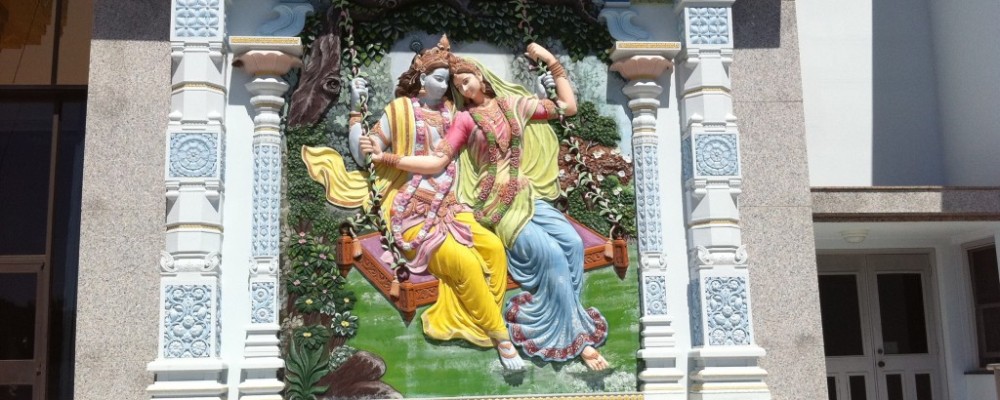Last Friday morning before meeting with Jamie Pennebaker at the University of Texas, I went to visit the Barsana Dham Hindu Temple – just outside Austin. Having never been to a Hindu temple before, I was not sure what to expect. Over the past few years I read some of the Hindu scriptures out of curiosity. Many of the principles of new psychology disciplines of well-being (like positive psychology) draw on some elements of Hindu philosophy, so it was interesting to see how the traditional view meets the new science. In my own naive understanding of Hindu philosophy, I see three core threads that run through many of the Hindu texts:
- Living with focus on the present
- Recognizing that all is connected in the universe, and –
- Focusing on one’s action and their “job”.
 Of course, concluding the tradition of a billion people over the past 5000 years in 22 words is bound to be (extremely) simplistic, but these high-level principles are what personally surfaced to me from what I have read.
Of course, concluding the tradition of a billion people over the past 5000 years in 22 words is bound to be (extremely) simplistic, but these high-level principles are what personally surfaced to me from what I have read.
Armed with my rudimentary knowledge of Hindu wisdom, and a deep curiosity about the Hindu temple in Texas, I arrived at Barsana Dham late morning and was astonished to find a polished gem nestled in the back roads of Hill Country. The temple resides in a beautiful building decorated by fine replicas of artwork from India and surrounded with ponds and little gardens. a peacock welcomed me as I was approaching the main entrance, and I was wondering how a biker in a leather vest fits within this landscape.
 In the temple I had the pleasure of speaking with Vrinda, who was born and raised in New England, and is a self-defined “seeker”. Vrinda roamed the world for years looking for answers to the questions she had as a young woman. She lived in different parts of India, Europe, and Jerusalem, and learned about the cultures and philosophies of these different places. In all them though, she found a principal flaw: she saw a divergence between what people read and taught and they way they were acting. For example – people would learn about letting go of their ego, and would become self-important with that knowledge… Eventually, she found a Hindu teacher who practiced what he preached and lived by the standards and of his ideas. At that point, in her own words she “fell in love with god”.
In the temple I had the pleasure of speaking with Vrinda, who was born and raised in New England, and is a self-defined “seeker”. Vrinda roamed the world for years looking for answers to the questions she had as a young woman. She lived in different parts of India, Europe, and Jerusalem, and learned about the cultures and philosophies of these different places. In all them though, she found a principal flaw: she saw a divergence between what people read and taught and they way they were acting. For example – people would learn about letting go of their ego, and would become self-important with that knowledge… Eventually, she found a Hindu teacher who practiced what he preached and lived by the standards and of his ideas. At that point, in her own words she “fell in love with god”.
This made me think about what Dr. Jamie Pennebaker told me when we met later in the day. When I asked him for his opinion about the different approaches and disciplines in psychology, he said “show me the money”. A person has to try different ideas and different practices and gauge what works best. No belief or philosophy are “one size fits all”. I strongly identify with this form of thinking. Like Larry David says – “Whatever works”.
Vrinda and I spoke at length, and I still need to think about our conversation. I left Barsana Dham with the basic feeling that there are no good answers to the big questions, but the search for the questions is quite a worthy ride , and Vrinda’s journey around the world places the quest as a goal in itself. And surely beyond doubt – if you are in Austin and want to see some unusual architecture, a beautiful place, and learn a new perspective from friendly and interesting people, be sure to pay the temple a visit.


